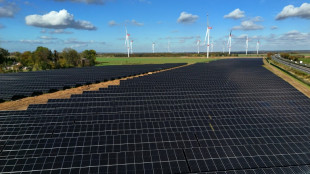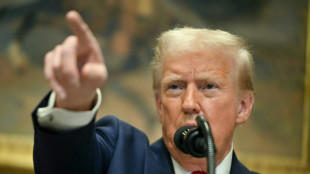
-
 Solar power surpasses coal in EU for first time
Solar power surpasses coal in EU for first time
-
Musk, Wikipedia founder in row over how to describe 'Nazi salute'

-
 Axel Rudakubana: troubled teen whose knife rampage shocked Britain
Axel Rudakubana: troubled teen whose knife rampage shocked Britain
-
Sasaki vows to 'give best' to fire-torn LA at Dodgers unveiling

-
 UK teen faces sentencing over murders that sparked riots
UK teen faces sentencing over murders that sparked riots
-
Larry Ellison, tech's original maverick, makes Trump era return

-
 Trump push to 'drill, baby, drill' may hit industry roadblock
Trump push to 'drill, baby, drill' may hit industry roadblock
-
Instagram courts TikTok stars during turbulent times

-
 Political crisis hits South Korea growth: central bank
Political crisis hits South Korea growth: central bank
-
Elephants are not people, US judges say

-
 Sinner aiming to be 'better, stronger' in Australian Open semi
Sinner aiming to be 'better, stronger' in Australian Open semi
-
Mass evacuations after explosive new fire erupts near Los Angeles

-
 Guardiola concedes Man City 'could not cope' with PSG as European hopes flicker
Guardiola concedes Man City 'could not cope' with PSG as European hopes flicker
-
PSG push Man City to brink with stunning Champions League comeback

-
 Arteta wants sunshine break as Arsenal move towards last 16
Arteta wants sunshine break as Arsenal move towards last 16
-
PSG comeback floors Man City as Arsenal near Champions League last 16

-
 Trump toughens crackdown on immigration and diversity
Trump toughens crackdown on immigration and diversity
-
Celtic make 'little bit of history' with Champions League progress

-
 As Trump declares 'Gulf of America,' US enters name wars
As Trump declares 'Gulf of America,' US enters name wars
-
Celtic make Champions League progress thanks to Young Boys own goal

-
 Trump's tariff threats are 'leverage,' says informal economic advisor
Trump's tariff threats are 'leverage,' says informal economic advisor
-
Trump halts refugee arrivals in crackdown

-
 Gangs could overrun Haiti capital if aid falls short: UN chief
Gangs could overrun Haiti capital if aid falls short: UN chief
-
PSG sink Man City with stunning Champions League comeback

-
 Leao sinks Girona and pushes Milan into Champions League top eight
Leao sinks Girona and pushes Milan into Champions League top eight
-
Feyenoord stun toothless Bayern in Champions League

-
 Arsenal on course for last 16 after beating Dinamo
Arsenal on course for last 16 after beating Dinamo
-
Real Madrid thrash Salzburg to get back on Champions League track

-
 Les Paul owned by guitar god Jeff Beck auctioned for over £1 mn
Les Paul owned by guitar god Jeff Beck auctioned for over £1 mn
-
Colombia moves to arrest guerrilla leaders behind wave of violence

-
 New explosive wildfire erupts near Los Angeles
New explosive wildfire erupts near Los Angeles
-
Valladolid say Man City tapped up young star

-
 Fear abounds as M23 fighters close in on DR Congo's Goma
Fear abounds as M23 fighters close in on DR Congo's Goma
-
Sabalenka, Swiatek eye final showdown at Australian Open

-
 Musk bashes Trump-backed AI mega project
Musk bashes Trump-backed AI mega project
-
Hundreds to wed as Thai same-sex marriage law comes into force

-
 Musk seeks Trump pardon for 'Bitcoin Jesus,' charged with fraud
Musk seeks Trump pardon for 'Bitcoin Jesus,' charged with fraud
-
Shakhtar deal blow to Brest's Champions League last-16 ambitions

-
 What would Trump tariffs mean for key trade partner Mexico?
What would Trump tariffs mean for key trade partner Mexico?
-
Does China control the Panama Canal, as Trump claims?

-
 Trump tells Putin to make Ukraine deal 'now' or face tougher sanctions
Trump tells Putin to make Ukraine deal 'now' or face tougher sanctions
-
Yemen's Huthis say freed detained ship's crew after Gaza truce

-
 Mel B, Trump and Milei: What happened at Davos Wednesday
Mel B, Trump and Milei: What happened at Davos Wednesday
-
Spain's Sabadell bank to move HQ back to Catalonia

-
 Wembanyama returns to Paris for NBA games as a global star
Wembanyama returns to Paris for NBA games as a global star
-
Fashion world 'afraid' of Trump, says Belgium's Van Beirendonck

-
 Besiktas romp to victory over Athletic in Solskjaer's first game
Besiktas romp to victory over Athletic in Solskjaer's first game
-
'Best feeling' as Hamilton drives first laps for Ferrari

-
 Argentina's Milei says would leave Mercosur for US trade deal
Argentina's Milei says would leave Mercosur for US trade deal
-
Musk slams Trump-backed AI mega project

| RBGPF | 0.26% | 62.36 | $ | |
| BCC | -0.94% | 127.92 | $ | |
| SCS | -1.9% | 11.58 | $ | |
| RYCEF | 2.02% | 7.42 | $ | |
| NGG | -2.56% | 60.05 | $ | |
| CMSC | -0.26% | 23.49 | $ | |
| JRI | -0.32% | 12.53 | $ | |
| BCE | -1.04% | 23.15 | $ | |
| RIO | -1% | 61.12 | $ | |
| RELX | -0.59% | 49.26 | $ | |
| CMSD | -0.17% | 23.96 | $ | |
| GSK | -1.05% | 33.43 | $ | |
| VOD | -2.03% | 8.38 | $ | |
| BTI | -0.44% | 36.57 | $ | |
| AZN | 0.35% | 68.2 | $ | |
| BP | -1.25% | 31.13 | $ |

In fractured Bosnia, Croats call for change
In deeply divided Bosnia, the country's Croats have unleashed new calls for sweeping electoral reforms along with threats of a potential boycott of upcoming polls, sparking fears that a new period of instability awaits the impoverished Balkan nation.
In southern Bosnia's Mostar -- considered the Croat heartland by the community -- the echo of church bells accompanies the Islamic call to prayer along the partitioned city's picturesque stone bridge connecting Croat neighbourhoods with a Muslim quarter.
But the sounds of harmony on the surface belie growing grievances among Bosnia's Catholic Croats over what they say are flaws in the electoral system that have undercut their right to choose its leader.
Mostar was devastated during the Bosnia war in the early 1990s, which fractured the country along ethnic lines.
Decades later, the upheaval among Bosnia's Croats comes as secessionist threats from the country's Serb leader are stoking concerns that Bosnia is on the verge of conflict again.
"Either we solve the problem by separating peacefully, or we make the house -- the state -- comfortable for everyone," Petar Vidic, a 48-year-old former Croat soldier, told AFP in Mostar.
- Bosnia's tripartite presidency -
Bosnia's brutal war ended with peace accords in 1995 that saw the country divided in two -- one half ruled by ethnic Serbs, the other by a Muslim-Croat federation.
The Balkan state's tripartite presidency rotates between a member from each community: Muslims, Serbs and Croats.
But the federation's Muslim population -- known as Bosniaks -- make up about 70 percent of its 2.2 million inhabitants. That gives them vast numerical superiority at the polls and de-facto control over who can be elected to lead the Croats at the presidential level.
"There are two Muslim members and one Serb member in the presidency," goes a common saying in Bosnia Croat political circles.
But for many Croats in Bosnia, the issue is no trivial matter.
After years of discontent, many of Bosnia's Croats are suggesting a boycott of the upcoming general election in October.
- 'Not logical' -
During a conference in Mostar in February, Bosnia's Croat parties gathered to plan their next steps, calling for urgent reforms. But they stopped short of announcing an all-out boycott.
"The formal conditions have not been met to organise the election until the electoral law is changed to ensure that all three ethnic groups are legitimately represented," said Dragan Covic, the head of Bosnia's largest Croat party.
Ilija Cvitanovic, another Bosnian Croat politician, took an even harder line.
"If someone thinks he can... deprive the Croatian people of legitimacy, suppress them, then he will have to answer for that," Cvitanovic told reporters.
Croat parties want a mechanism to allow the community to appoint their own representatives to the presidency and upper house -- a move fiercely opposed by the federation's ruling Bosniak party.
Bosnia's current Croat President Zeljko Komsic, who is effectively backed by Bosniak voters, has also lambasted the idea, calling it "an electoral law based on apartheid".
For many of Bosnia's Croats however, reforms are necessary to stave off further divisions or possible secession in the already deeply fractured country.
"Yes, we should all have the same rights," said Sima Pehar, a 78-year-old Croat pensioner.
"Why should someone who is not elected by Croats represent Croats? It is not logical."
- 'Everyone is leaving' -
But critics of the recent push for reforms say it would only serve the interests of the political elite in what they say is a dysfunctional country that continued to stagnate even after the war ended.
Even in peace, they say, Mostar has long been ruled by hardliners from both sides.
"Nothing will change for the citizens of Bosnia and Herzegovina with the possible reforms to the electoral rules," analyst Ivana Maric told regional broadcaster N1.
"This is just another story to keep people's minds occupied and prevent them from thinking about concrete things."
Mostar still boasts the cinematic beauty of its famous bridge, built by the Ottomans in the 16th century, destroyed by Croat militia forces in 1993 and rebuilt in 2004.
But people are still fleeing the city en masse, part of a nationwide phenomenon.
"Everyone is leaving Bosnia -- Croats, Bosniaks and Serbs," said the pensioner Pehar.
"The economy is a disaster. Those who govern us brandish the threat of war and people flee."
Meanwhile, Western-backed negotiations on possible reforms have stalled, stirring fears of a boycott, renewed unrest and a possible push to dissolve Bosnia's Muslim-Croat federation.
"I am convinced that the crisis will continue if the electoral law is not changed," said analyst Zoran Kresic.
"It is bad for the whole of Bosnia and its Euro-Atlantic future, and will unfortunately reflect on the people."
Y.Baker--AT
